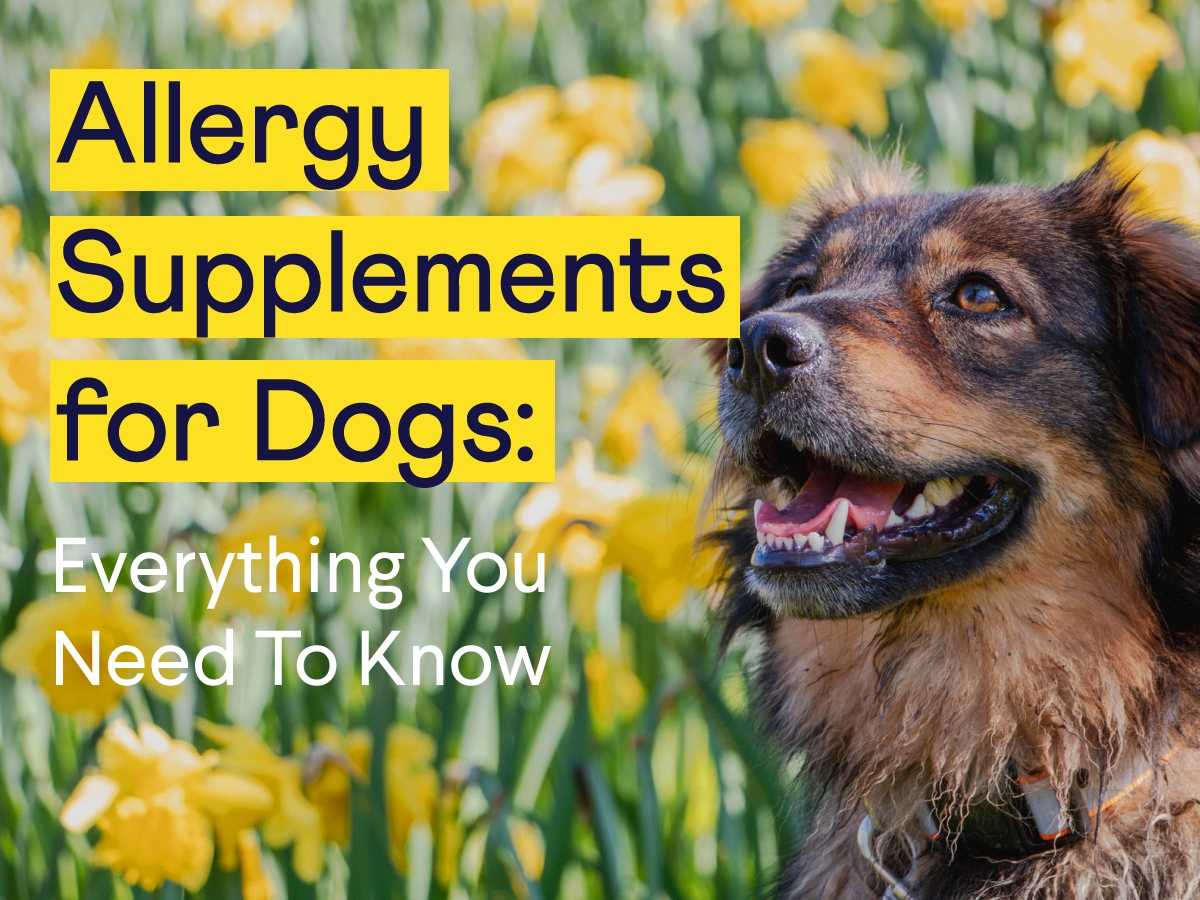
Allergy Supplements For Dogs: Everything To Know
Allergy supplements for dogs — are they beneficial and what should you look for? Finn has everything you need to know to help reduce your dog’s symptoms.
If you’re one of the many pet parents with a constantly itching dog, you know just how helpless it can make you feel. We love our dogs and would do anything for them. When they suffer from allergies, it’s our nature to do whatever we can to keep them comfortable.
Part of a well-rounded approach for an allergic dog includes using the right supplements. However, with so many allergy supplements for dogs on the market, how do you know which ones actually work?
Why Would My Dog Need an Allergy Supplement?
Before picking up allergy supplements for dogs, how exactly do you know that your dog needs one?
For starters, it helps to know what symptoms to be on the lookout for. While these symptoms may have multiple causes, if your dog is experiencing them regularly, if they are getting more severe, or if you notice they occur with specific triggers, it’s likely time to contact your veterinarian.
- Constant or obsessive licking of the paws or limbs
- Diarrhea
- Hives
- Localized itching (often of the ears or the base of the tail)
- Recurrent ear or skin infections
- Reddened skin
- Sneezing
- Vomiting
- Watery, runny eyes
Only your vet can officially diagnose allergies and give you accurate advice specific to your dog’s unique health situation. In some cases, they may recommend prescription allergy medications that you can only get through a professional.
What Are Dogs Usually Allergic To?
Just like us, allergy triggers can vary significantly from dog to dog. Although nearly anything has the potential to become a trigger, there are specific allergens that veterinarians see far more frequently than others.
There are a few ways that common dog allergens can be classified, depending on who you ask. Most commonly, they are categorized by route (inhaled, food, or skin) or where that allergen can be found (environmental, for instance).
For this article, we’ll share the most frequently diagnosed allergens:
- Beef
- Chicken
- Dairy
- Dust mites
- Flea bites
- Mold spores
- Pollens
- Soy
- Wheat gluten
Identifying the specific allergen that may be causing your dog trouble can help find the best course of treatment. You may want to keep an “allergy diary” for your pet and write down when they’re having a (non-severe) allergic reaction, what that reaction looks like, and what they were doing before developing symptoms.
What Supplements Can Help With Dog Allergies?
Omega Fatty Acids
One of the most popular categories of allergy supplements for dogs is omega fatty acids — specifically, omega-3 and omega-6.
Omega fatty acids can’t be made naturally by the body, so our dogs need to consume them through their diet (either in their dog food or via supplementation). They each play a crucial role in the body — omega-3 fatty acids like DHA are essential for brain function and cell membrane development, and omega-6 fatty acids like linoleic acid help support healthy hair and skin.
Their most important quality, especially when supporting allergy-prone dogs, is that they reduce swelling throughout the body (one of the main characteristics of an allergic reaction).
While omega fatty acids are beneficial for dogs with allergies, they are also recommended to help maintain the health and functionality of the joints. You may see these on an ingredient list as “fish oil.”
Probiotics
Another allergy supplement for dogs that often lives up to the hype is probiotics. If you’re unfamiliar with probiotics or what they do, these supplements provide an additional “good” bacteria source for your dog’s system. Often probiotics are explicitly targeted at your dog’s gut and are meant to help balance out the microbiome there, which keeps the gut functioning at its most optimal level.
You may not know that research has shown a potential relationship between gut health and skin health, known as the gut-skin axis. The scientific theory states that intricate interactions happen between the immune system, gut, and skin.
The body can constantly work to moderate both local and systemic swelling reactions through these interactions. However, if something is “off” with one system, it is more likely to progress to the other system because of that close communication. Regulating them can be a significant advantage in managing allergic responses in our pets.
Digestive Enzymes
Digestive enzymes work similarly to probiotics. These enzymes are naturally present in the gut and work to break down nutrients and help the body efficiently absorb them. When your dog is deficient in these enzymes, they cannot get the most out of the vitamins and minerals via their food, treats, and additional supplementation.
Digestive enzymes don’t just impact the gut, though. While they influence your dog’s ability to digest food, they can also affect their ability to produce and maintain skin cells and create the natural oils (sebum) they need to keep their skin and coat moisturized and healthy.
There is also some evidence that digestive enzymes can help reduce swelling, both externally (in the form of skin allergy symptoms) and internally (the body’s natural reaction to GI triggers, like diarrhea and vomiting).
However, you won’t frequently see “digestive enzymes” on an ingredient list. Often, this ingredient is listed as its specific component — amylase, lipase, and protease are good examples.
Quercetin
Quercetin, often called “nature’s Benadryl,” can be seens alone on an ingredient list, but it is also one of the active ingredients of bee pollen (or bee propolis).
Quercetin falls into the category of polyphenol, micronutrients that can be found naturally in plants. Through research, it has been found that certain polyphenols (like quercetin) may help with making dogs less sensitive to their trigger allergens by inhibiting the release of the mast cells that cause the reaction. In this way, quercetin functions as an antihistamine and an anti-inflammatory.
The compound also is considered an antioxidant, an essential defense against the oxidative stress caused by free radical damage in the body (and part of a well-rounded wellness supplement for dogs). Part of the body's response to oxidative stress is inflammation, so anything that can decrease or stop that from happening is also beneficial in the fight against allergies.
Turmeric
While turmeric is a spice frequently used in cooking, it also has roots in Eastern medicine. Specifically, the active compound in turmeric (curcumin) has the potential to act as an anti-inflammatory (especially for gastrointestinal and skin-related allergy symptoms).
However, although turmeric is safe for dogs in small amounts, it hasn’t been the focus of as much research as it has been for humans (and only in very specific conditions like uveitis).
The main problem with supplementing turmeric in your dog’s diet is that curcumin isn’t as bioavailable for absorption as other supplements are (aka easy for the body to absorb and use). That means it’s best to choose supplements containing that specific active compound instead of just “turmeric” to ensure your dog has more efficient access to those benefits.
Bromelain
Like most of the other over-the-counter allergy supplements for dogs, bromelain functions as an antihistamine. By working to slow down the release of the symptom-inducing histamines in the body (which occur when your dog encounters one of their allergens), bromelain may help keep your dog more comfortable.
However, bromelain is an enzyme that is derived from the stems of a fresh pineapple plant. Dogs who have a large number of food allergies or those with known sensitivities to pineapple should avoid supplements with this ingredient.
Bromelain is also frequently seen paired up with quercetin on ingredient lists. The reason for this is that they work “synergistically” as each ingredient helps increase the absorbency of the other, making them both more potent.
How Can I Pick the Right Allergy Supplement for My Dog?
When choosing allergy supplements for dogs, you’re already taking the first step by doing your research!
There are a few tips and tricks you can use to find the best options for your dog:
- Always start by asking your veterinarian for recommendations and advice before starting any new supplements. Certain supplements have the potential to react with prescription medication or may worsen pre-existing medical conditions.
- Never give human-grade supplements to your dog. The dosing on these products is not meant for dogs, and you may accidentally give your dog too much or not enough. Not to mention, they may contain other additives and ingredients that are plain unsafe for your doggo, too!
- Stick with supplements that include ingredients backed by clinical research or scientific studies. There are plenty of supplements on the market, but not all live up to the hype.
- Always read the label thoroughly to confirm the supplement doesn’t contain any ingredients your dog may be allergic to or not recommended. While this isn’t usually an issue with allergy supplements for dogs, it’s still a good idea to be hypervigilant when it comes to your dog’s health.
- Purchase supplements from companies that are transparent about how their products are formulated and manufactured. We recommend sticking with National Animal Supplements Council (NASC) approved products and looking specifically at their quality control measures.
- Choose a supplement form that works for your dog. For example, if you have an older dog that can’t chew well, you wouldn’t want to purchase a hard supplement.
Allergy Supplements for Dogs Aren’t a Cure-All
Allergies are not curable; medications (both supplemental and prescription) aim to help reduce the severity of the symptoms and improve your dog’s quality of life.
In addition to medications, you may also need to change up your dog’s diet to help them avoid any food-related triggers. Many dogs will ultimately end up on a limited or hypoallergenic dog food designed for dogs with allergies. Finding the right dog food for your pup’s specific allergy triggers can take time, so be patient if the first one (or few) doesn’t work out.
You’ll also want to explore ways to reduce your dog’s exposure to other environmental triggers. For instance, if your dog’s allergies seem to worsen in the spring or fall, they may be allergic to certain pollens during those times.
While you likely can’t help your dog avoid them entirely because they’ll eventually need to go outdoors to use the bathroom or go for a walk, you can help reduce their exposure time. An excellent example of a way to do this is to schedule your walks according to when pollen counts are usually the lowest — avoiding the early morning and late afternoon.
Some dogs may also benefit from more frequent baths, especially during allergy season (if they suffer from environmental or seasonal allergies). Baths (or wipe-downs) help remove any allergens that have built up on their coat, potentially reducing the likelihood or severity of a reaction.
In addition, it is also recommended that you wash their bedding more frequently during these times as well. This helps in a similar way, as allergens can be easily transferred from your dog to their bedding, especially if your dog has a favorite spot that they always gravitate towards.
In Summary
Allergy supplements for dogs are just one of the many components that can help with managing your pet’s itching, discomfort, and other related symptoms. While watching your pet struggle with allergies can be challenging, you don’t just have to sit back and watch helplessly.
With the appropriate information and by working with your veterinarian, you can help ease your pet's allergy symptoms and get them back to their usual, loveable selves in no time.
Sources:
Texas A&M Researchers Develop Treatment For Canine Ocular Condition Using Turmeric | TAMU










Comments: